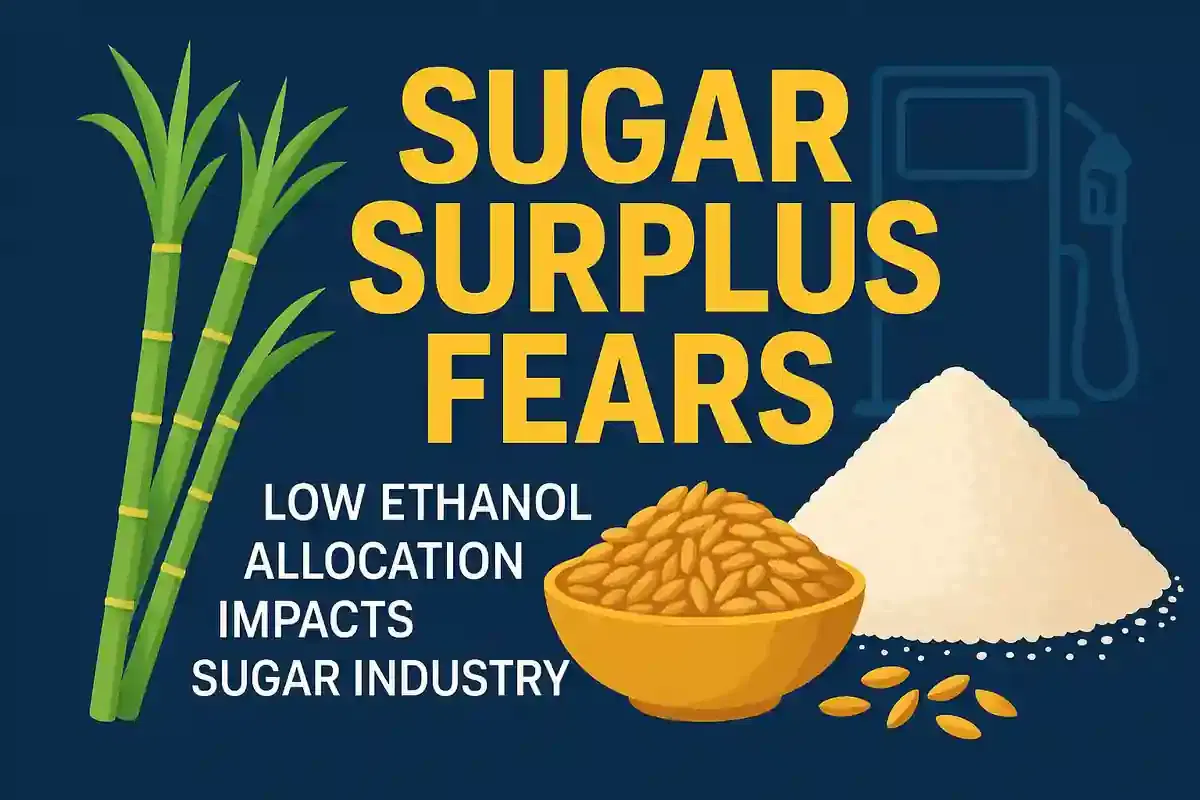Sugar Industry Concerned Over Low Ethanol Allocation for 2025-26, Citing Surplus and Farmer Payment Risks
Commodities
|
29th October 2025, 3:02 PM

▶
Short Description :
Detailed Coverage :
News Summary: The Indian Sugar and Bio-Energy Manufacturers Association (ISMA) has expressed significant concern over the allocation of ethanol for the 2025-26 supply year by Oil Marketing Companies (OMCs). A disproportionately small portion of ethanol procurement has been allocated from sugar-based feedstocks, raising alarms within the industry. Key Figures: For the 2025-26 Ethanol Supply Year (ESY), only 2890 million litres (28% of the total requirement) have been allocated from sugar-based sources. In contrast, grain-based sources like maize and rice have been allocated a much larger share of 7610 million litres (72%). Industry Concerns: ISMA warns that this imbalance could lead to a surge in surplus sugar stocks, as projected sugar production for 2025-26 is expected to rise by 18% to 34.9 million tonnes (MT). With only a small amount of sugar eligible for diversion to ethanol, a glut is anticipated. This situation also risks underutilizing distilleries that were set up based on previous government roadmaps, involving an investment of over Rs 40,000 crore. Furthermore, the industry fears delayed payments to farmers due to strained mill liquidity. Industry Demands: To mitigate these issues, ISMA has requested that OMCs rebalance ethanol procurement to allocate at least 50% to sugar-based sources. They are also seeking permission to export at least two million tonnes (MT) of raw sugar in the 2025-26 season and a revision of the Minimum Selling Price (MSP) for sugar. Financial Strain: The article highlights a financial mismatch where the cost of producing ethanol from sugarcane juice and B-heavy molasses is higher than the current procurement prices offered by OMCs, creating a loss of approximately Rs 5 per litre. This makes sugarcane-based ethanol production unviable. Additionally, the MSP for sugar has remained unchanged since February 2019, while the Fair and Remunerative Price (FRP) for sugarcane has increased substantially, boosting the cost of sugar production. Government Consideration: Reports indicate that the food ministry is considering allowing sugar exports for the 2025-26 marketing year due to accumulating surplus stocks. Impact: This news has a significant impact on the Indian stock market, particularly affecting companies in the sugar and allied sectors. It highlights potential financial strain on sugar mills, impacting farmer payments and investment returns. The government's policy on ethanol blending, which influences demand for sugar and molasses, is also a key factor. This could affect commodity prices, corporate earnings, and investor sentiment in the agri-business and energy sectors. Impact rating: 8/10. Difficult Terms Explained: OMCs (Oil Marketing Companies): Companies involved in the marketing and distribution of petroleum products like petrol and diesel. Examples include Indian Oil Corporation, Bharat Petroleum Corporation Limited (BPCL), and Hindustan Petroleum Corporation Limited (HPCL). Ethanol: A type of alcohol produced from the fermentation of sugars and starches, often used as a biofuel additive to petrol. Feedstock: The raw material used in an industrial process. In this context, it refers to sugarcane juice, molasses, or grains used to produce ethanol. ESY (Ethanol Supply Year): The period during which ethanol is supplied to Oil Marketing Companies, typically running from November to October in India. MT (Metric Tonne): A unit of mass equal to 1,000 kilograms. MSP (Minimum Selling Price): The lowest price at which a commodity can be sold, as fixed by the government to protect producers. ISMA (Indian Sugar and Bio-Energy Manufacturers Association): An industry association representing sugar and bio-energy manufacturers in India. NITI Aayog: National Institution for Transforming India, a government policy think tank. E20: A fuel blend consisting of 80% gasoline and 20% ethanol. FRP (Fair and Remunerative Price): The statutory minimum price announced by the government for sugarcane purchased by sugar mills from farmers. Quintal: A unit of weight commonly used in South Asia, equivalent to 100 kilograms. B-heavy molasses: A byproduct of sugar refining, which is a thick, dark syrup and a primary source for ethanol production.